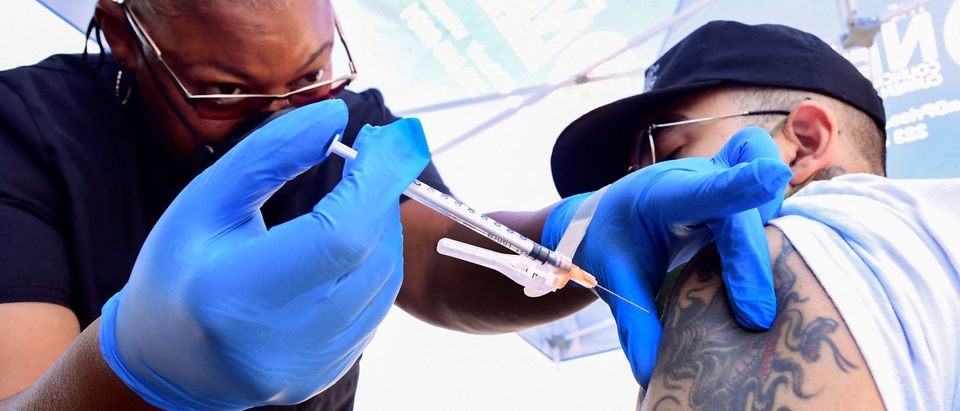Only around half of all Americans are fully vaccinated, but some are going ahead and getting a third additional dose to bolster their immunity.
Pfizer has been warning that a booster dose of its COVID-19 vaccine may be necessary down the line. Select groups of people in the U.S. and around the world are getting ahead of the ball and adding a third jab already.
France has been administering third doses of the two-dose vaccine regimen to some immunocompromised patients since April. In Israel, immunocompromised residents began receiving third doses Monday. Thailand is giving third doses to some healthcare workers who got a less effective Chinese vaccine.
#Thailand 🇹🇭
Reuters: 618 of the 77,348 medical workers (.7989%) who were vaccinated w/ #Sinovac have contracted #COVID19 between April-July. A 3rd dose (with a different vaccine now being considered).https://t.co/uNlVHFs9cO
The reality: likely better than no vaccine at all.
— 🚶🏻Curtis S. Chin (@CurtisSChin) July 11, 2021
In the U.S., roughly five percent of the population with underlying immune conditions is largely on their own for now. Esther Jones, a dialysis nurse in Oregon who survived a Kidney transplant in 2010, sought out a dose of the Moderna COVID-19 vaccine after two doses of Pfizer’s offering did not induce a sufficient immune response, according to the New York Times.
After the third dose jolted her antibody levels, she went on to get a fourth dose, her second Moderna shot. Jones was able to receive the additional doses by enrolling in a study of organ transplant recipients by researchers at Johns Hopkins.
Despite the promising results of that study, there has been no concerted effort by American health authorities to research and approve additional vaccine doses for vulnerable populations. Next week, a federal advisory panel will convene to consider whether healthcare workers should be permitted to administer additional shots to vulnerable populations.
The consideration is occurring after Pfizer announced its intention to seek approval for booster shots in the coming weeks. (RELATED: Nearly Half Of Those Who Haven’t Taken The COVID Vaccine Say They Will Definitely Not Get It: Poll)
Even as early trial results prove promising, there are still remaining questions about the efficacy, safety and ethics of giving out third and even fourth vaccine doses in countries that can afford to.
Booster vaccines may prove useful as COVID-19 continues to evolve, Dr. Paulo Verardi told the Daily Caller: “Our major challenge for COVID-19 are the new variants that have key mutations that not only improve transmissibility, but may also lower the efficacy of the first-generation COVID-19 vaccines. We must remember that the vaccines that have received Emergency Use Authorization are all based on the original SARS-CoV-2 isolated in Wuhan, China.”
Verardi, an Associate Professor of Virology and Vaccinology at the University of Connecticut, added that “The most pressing issue, at the moment, is to first get most of us fully vaccinated, and then think about booster shots for those already fully vaccinated.”
There is evidence that mixing different types of vaccine doses, as Jones did, could result in harsher side effects. The Centers for Disease Control and Prevention (CDC) has warned that mixing-and-matching vaccines isn’t necessarily safe.
Not all experts agree on that point, though. “There is not a major concern about safety or mixing and marching. We have data demonstrating the safety and efficacy or this approach,” Dr. Amesh Adalja, Senior Scholar at the Johns Hopkins Center for Health Security, told the Daily Caller.
Still, he said additional doses for Americans probably isn’t necessary for the time being: “To me, the trigger for needing boosters is seeing fully vaccinated individuals develop severe breakthrough infections that require hospitalization — that is just not happening.”
Both the CDC and the Food and Drug Administration (FDA) have said thus far that third doses are not widely needed. In a joint statement issued last week, the agencies said “FDA, CDC, and NIH are engaged in a science-based, rigorous process to consider whether or when a booster might be necessary … we are prepared for booster doses if and when the science demonstrates that they are needed.”
Dr. Anthony Fauci says Americans who are fully vaccinated don’t need a booster dose of the Covid-19 vaccine at this time https://t.co/mxTmUBwnIf
— CNN Politics (@CNNPolitics) July 11, 2021
Dr. Monica Gandhi, professor of medicine at the University of California San Francisco, told the Daily Caller that the main reason authorities aren’t approving third shots yet is that the existing regimens are proving highly effective. “The reason the FDA/CDC is not recommending booster shots right now is because two doses of the mRNA vaccines and 1 dose of the J&J hold up extremely well against the variants.”
“Moreover, although vaccines are safe, getting a booster shot when not indicated can raise your risk of having side effects, so we should weigh these decisions carefully,” she added.
The World Health Organization (WHO), meanwhile, has blasted discussions of additional shots in rich countries while most of the developing world is still woefully unprotected. “At this point … there is no scientific evidence to suggest that boosters are definitely needed,” WHO chief scientist Dr. Soumya Swaminathan recently said.
“We are making conscious choices right now not to protect those in need,” said WHO chief Tedros Adhanom Ghebreyesus of the lobbying to get more doses used in rich countries. (RELATED: Palestinians Turn Down 1 Million Vaccine Doses From Israel)
Dr. Gandhi agreed, arguing that it may even be more beneficial for Americans to vaccinate the rest of the world first before getting boosters: “The benefits are marginal, there may be an increase in side effects with an unnecessary third shot, and variants will keep emerging worldwide in this time of high transmission globally unless we can get the world vaccinated. This is not only the ethical thing to do but will keep those in the US more safe from the emergence of further variants.”


